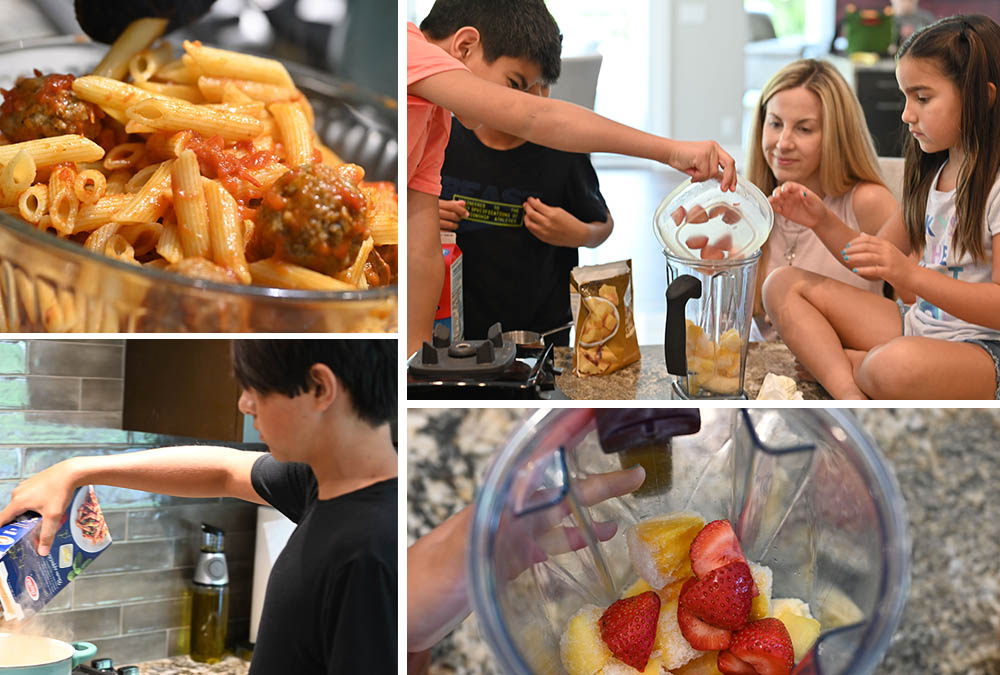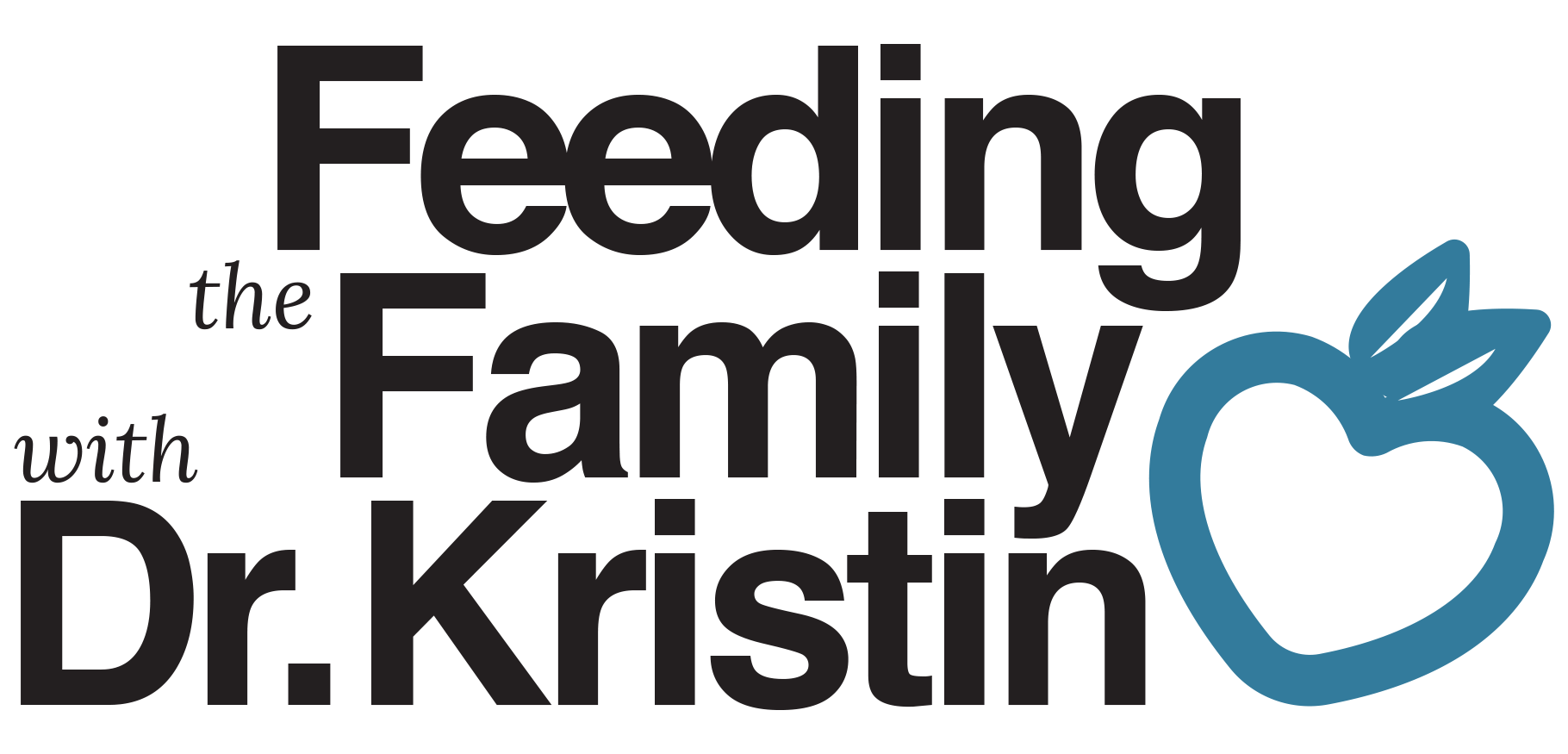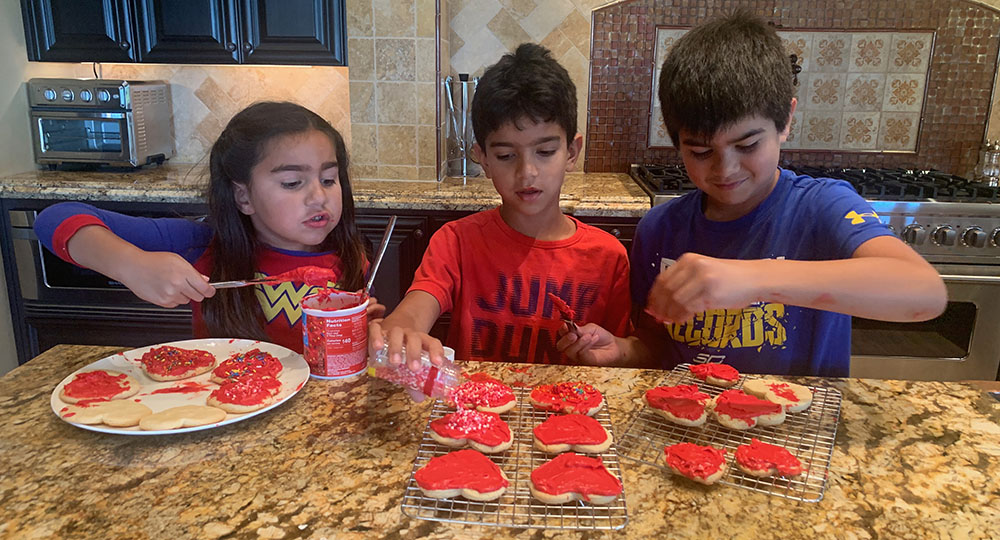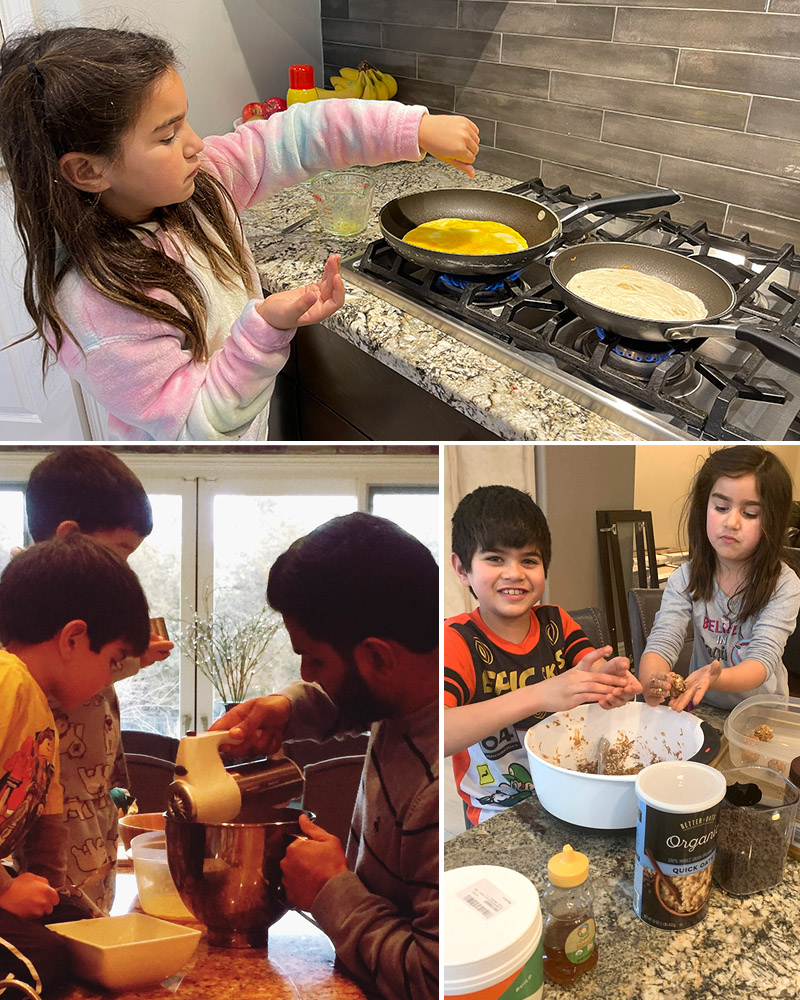You know the benefits of family meals and getting your kids involved in the kitchen, but you may be wondering how to get started. Children of all ages can enjoy being part of the meal preparation process and can learn incredibly valuable cooking skills that will serve them for a lifetime. Cooking can help kids practice motor skills, math and reading while also teaching them teamwork and building their self-confidence. Preparing and sharing meals as a family provides myriad benefits to both kids and adults both nutritionally and in terms of many other life outcomes. Even better, the sooner you teach your child kitchen skills, the sooner they will be able to help you out independently.
This guide provides a general idea of kitchen tasks that fit the skill set and attention span of kids by age. Keep in mind, of course, that all kids develop at a different pace. Some children may be able to complete tasks well above the age range we have outlined, while some may not yet be ready for all tasks on the list (especially if they are new to the kitchen!).
The most important thing is safety and keeping it fun (except for maybe with washing dishes…). Always supervise your child closely until you know they have confidently mastered a skill and can consistently perform it independently. Keep in mind that cooking with kids, especially younger ones, can take a lot of patience and not every busy weeknight might be ideal for the involvement of your pint-sized “helpers”.
Ages: 0-2
Though not much help (at all), kids this age benefit tremendously from being in the kitchen while you cook. Kids learn so much from what they observe. Being in close proximity to you while you prepare meals allows them to gain familiarity with the sights, sounds, and smells of healthy, homecooked food.
If your child is very young, set them up somewhere safe like a high chair or bouncer. Let them play with cooking tools like wooden spoons, whisks, measuring cups, and plastic-ware. Talk to them about what you are doing (one of the greatest things you can do to improve their reading readiness and vocabulary). If it makes sense, let them touch, smell and taste the ingredients you are using to prepare the meal.
Ages: 2-3
At this age kids can actually start helping out with simple tasks. They need a lot of supervision and may test your patience, but what they lack in skill, they usually make up for in enthusiasm.
- Rinse fruits and vegetables.
- Scrub potatoes
- Use a salad spinner
- Pick leaves off fresh herb stems
- Basic stirring/ mixing
- Mash potatoes/ bananas/avocados with a fork or masher
- Sprinkle salt
- Hold dust pan (for sweeping)
Ages: 4-5
By preschool kids have developed better fine motor skills and are ready to take on tasks that require a little more dexterity! Every child’s fine motor skills develop at a different pace and kids this age still need a lot of assistance and supervision. One of the most fun things for kids at this age is to start cutting and chopping. Letting them cut soft foods with a plastic knife or butter knife is a good start. Or, find yourself a “kid safe” knife that will allow them to cut firmer foods.
- Grease pans
- Squeeze lemons/ limes
- Crack eggs (a favorite in my house!)
- More advanced mixing/ Stirring
- Tear lettuce
- Measure wet and dry ingredients (with help)
- Cut soft foods (strawberries, bananas, mushrooms) with kid safe knife (with supervision) – My FAVORITE: Kuhn Rikon kinderkitchen –
- Put away dishes from dishwasher
- Set/ Clear the table
- Spray/ wipe countertop or table
Ages: 6-7
Grade-school aged kids have even more hand-eye coordination and often more practice with following directions ☺. They especially like feeling like big kids so allowing them to use more kitchen “gadgets” can be very exciting. Now that they can read, having them help with following a recipe can be a great way to practice reading skills and even introduce fraction and measurement concepts.
- Dice and chop vegetables with kid-safe knife
- Use scissors to snip herbs
- Measure more independently
- Roll dough balls/ form patties
- Slice and scoop avocados
- Use a Microplane zester
- Drain and rinse canned beans
- Make and toss salads
- Start reading recipes
- Decorate the table
- Garnish plates
Ages: 8-9
Kids this age can be a lot more independent and, unfortunately for them, usually have the skills to do a decent job cleaning up. Allowing them to make simple things independently can be a huge confidence boost for kids in this group as they prepare for adolescence. Although they need less supervision, they should always have an adult with them in the kitchen if they are doing anything that could result in injury.
- Grate cheese with a box grater
- Use a manual can opener
- Use a peeler
- Chop most foods with paring knife or small serrated knife
- Toast bread
- Scoop batter into muffin tins
- Use stand mixer or hand mixer
- Skewer kebabs
- Make sandwiches
- Make part of their own school lunch
- Start to read and follow a simple recipe
- Put away leftovers
- Empty and load dishwasher
- Take out the trash and replace the bag
- Rinse dishes
- Help put groceries away
Ages: 10-12
Kids this age can usually work (mostly) independently in the kitchen once they have learned basic kitchen skills and safety. Let them help with meal planning and look for new recipes to try! At this age, an adult within range for safety and sanitation reminders (washing hands, taking care when removing items from the oven) is a good idea but most of these kids can use the stove and oven to complete easy tasks like making omelets or baking cakes! They can also (much to their chagrin) clean up the kitchen on their own.
Age: Teenagers
Teenagers who have had practice with basic kitchen skills can independently make simple meals without any supervision at all! You did it! If it makes sense for your family, you can even have a teenager be responsible for making dinner once or twice a week. You can encourage them to try something new or allow themthe chance to practice at making a few of their favorite, simple meals every week. Teenagers who drive can pick up groceries.
Involving your teenager in the process of family meal planning and preparation can add up to valuable “face time” with your older child. It can also help them create the habit of cooking and eating healthy meals at home…even after they are out on their own!



